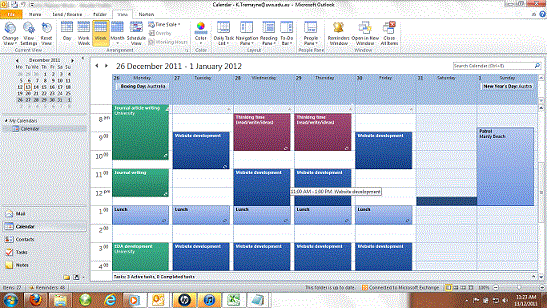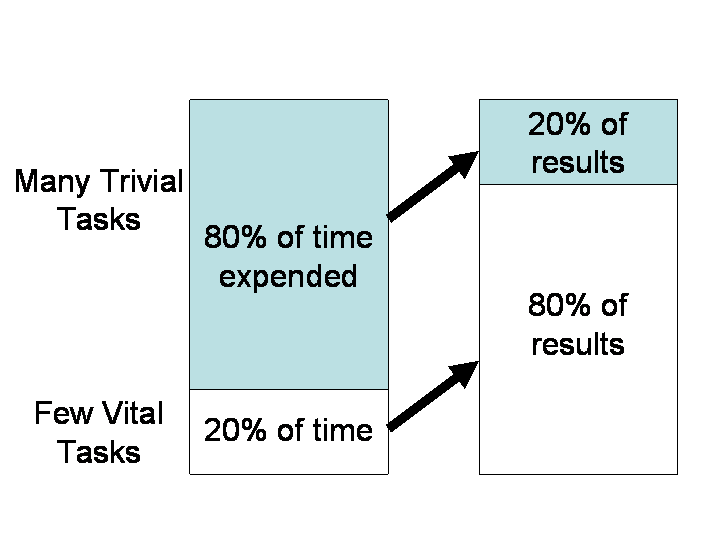- Home
- 7 Steps of Goal Setting
- For Life
Your Personal Time Management System
Personal time management is about getting off the treadmill of jumping from crisis to crisis and taking control or your tasks, your day, and your life. There has never been an age when we have managed to get so much done, yet at the same time be so overwhelmed with information, emails and tasks to do.
For many, work is a constant stream of email, requests from co-workers and customers, phone calls and reports. "There's just never enough time" is the common phrase as too many demands vie for our attention.
Adopting a personal time management system can sometimes feel like a mismatch between your personal way of doing things and the box that the system is trying to fit you into. Whatever personal time management system you choose it needs to be solid enough to enable you to do your most important things but have enough freedom to be able to retain current demands, requests, and your own style of doing things.
Whatever time management system you choose it needs to:
- keep your vital tasks (those that are cascading from your strategy or goals) on the front burner of your thoughts so that they don't get crowded out by less important stuff. If you like paper planning then Franklin Covey Planners are useful here. If you like software then Franklin Covey software may be an option.
- capture all the stuff that is on your near term horizon. It really needs to get stuff out of your head and into a central location that you trust has ALL your current and near future actions in. For this GTD is great.
- have a calendar so that you can schedule important activities in advance.
Identify the vital few activities that bring highest returns
How much do you earn per year. If you earn $50k then your time is worth 10c per minute. If you bring in $100k per year then your time is worth 20c per minute. Now I am talking about when you are sleeping, working, or playing. Now if you want to bring more value to each moment then you really need to leverage your time.

While time management tools can leverage your time the greatest form of leverage is to ensure that you are doing those activities that give you the highest return for your time. What are these activities?
These are those activities that move you towards your goals. Personal time management is about getting off the treadmill of jumping from crisis to crises, and spending your time on activities that move you toward your goals.
Some of the most successful people build a reputation for clarifying a vision, articulating their goal, and developing objectives to reach them. By setting goals and concrete objectives to achieve them, you have a foundation for good personal time management. You are able to clarify priorities of incoming tasks and assign them into your personal time management system.
Protect the vital few from the trivial many
Prioritizing would be a snap if you weren't so busy. It is not enough to set goals and define your objectives. You now need to make time for them rather than falling into the trap of being reactive. The simplest way to do this(yet hard to maintain) is to make time for these things in advance rather than trying to find time at the last moment.
This involves creating place holders in your calendar in advance to get those things done. If you don’t take control of your life, then someone else will!

How to choose these activities to schedule in advance?
While there is no one size fits all when it comes to priorities, I find that the Pareto principle is a good priority system for my personal time management.
The Pareto principle ensures that I spend my time on those 20% of tasks that yield 80% of the results. This boosts my time management skills and reduces stress.

I stay on the right side of this 80/20 rule by:
- Structuring my week in my weekly planner.
- Defending my priorities with my objectives.
- Scheduling time to stay on the right side of the 80/20 rule
How to make your personal time management work
- Have a system that captures everything. Whether this is free GTD software or your own system it does not really matter. What matters is that you have one system that you trust.
- Be clear on your goals and schedule time into your calendar that moves you towards these goals. Recognise that your concentration is most likely to max out after about 2 hours so don't schedule any more time than that. For intense periods of concentration consider using the Pomodoro technique or tracking software to block out distractions.
- Leave enough space in your calendar to deal with the unplanned stuff. Try not to schedule more than 5 hours per day of work otherwise you may find that the rigour of the calendar is difficult to hold. Please note that this is a common mistake and you will notice it when you start to spend a large amount of time shuffling appointments in your calendar.
- Have your email intimitately connected to your system. This is easily done in Outlook, Lotus notes, or Groupwise, but there are plugins that can transform your email system into a planning maestro. I like Achieve Planner which has a 30 day free trial to road test.
- Recognize when you work best and schedule this time for your high impact activities.
If you liked this personal time management article then you may also like:



New! Comments
Have your say about what you just read! Leave me a comment in the box below.